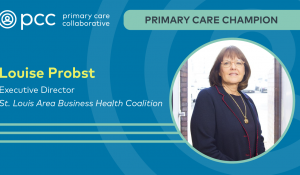News Room
March 20, 2019 | ROI New Jersey
Making good on a commitment he made earlier in the year, state Department of Health Commissioner Shereef Elnahal published guidance Monday that he hopes will allow health care providers to better serve behavioral health and substance abuse...
March 20, 2019 | Kaiser Health News
When Beverly Dunn called her new primary care doctor’s office last November to schedule an annual checkup, she assumed her Medicare coverage would pick up most of the tab.
The appointment seemed like a routine physical, and she was...
March 19, 2019 | American Academy of Family Physicians
On Monday, March 11, I was eagerly anticipating the release of the administration's fiscal year 2020 budget proposal(www.whitehouse.gov) when an email popped up in my inbox. That email linked me to a commentary article in The American...
March 19, 2019 | PCORI
The Patient-Centered Outcomes Research Institute (PCORI) Board of Governors today approved $3.8 million to fund two projects designed to use shared decision making to disseminate and implement PCORI research findings and to simultaneously...
March 19, 2019 | PCORI
atient-Centered Outcomes Research Institute (PCORI) Executive Director Joe V. Selby, MD, MPH, has informed PCORI’s Board of Governors that he plans to retire at the end of 2019.
PCORI, authorized by Congress in 2010, is the nation’s...
March 18, 2019 | New York Times
The kind of thing we have done instinctively in our workplaces for two decades — sending a quick email instead of setting up a meeting — has until recently eluded many doctors.
Electronic consultations, or eConsults (sometimes called...
March 18, 2019 | Health Affairs Blog
Screening for social determinants of health (SDOH) is increasingly done in primary and specialty care settings. Payers and health care organizations have recognized the importance of these determinants not just to clinical outcomes but...
March 16, 2019 | Washington Post
Gilbert Saldana, 22, still has a couple of months before he graduates from Georgetown University, but anxiety about his future is already keeping him up at night.
“I’m almost in the job world, and it really weighs down on me,” said the...
March 16, 2019 | The Hill
During the 20th century, America’s commitment to preventive health efforts such as water purification and vaccinations all but eradicated many deadly illnesses and, in the process, extended the average life expectancy by three decades,...
March 15, 2019 | Health Affairs Blog
Accountable care organizations (ACOs) have become a major payment and delivery reform since they were introduced as a key component of the Affordable Care Act. Currently, there are more than 1,000 ACOs covering about 33 million lives...
March 15, 2019 | NOLA
Half of the 181 graduating medical students from LSU Health New Orleans who participated in Match Day this year will remain in Louisiana to finish their training. The National Resident Match Program is a pivotal day in a medical student’s...
March 12, 2019 | Wall Street Journal
UnitedHealth Group Inc. said it would significantly expand a change to how it handles rebates from drugmakers by requiring new employer clients to pass them on to people who take the medications.
The move will apply to employers that sign...
March 12, 2019 | The Hill
If people in this polarized nation can agree on one thing, it is that prescription drug prices are too high, and that the federal government should do something about it. But it seems unlikely that Congress or the administration will do...
March 11, 2019 | Health Affairs Blog
On February 11, 2019, the Office of the National Coordinator for Health Information Technology and the Centers for Medicare and Medicaid Services released two highly anticipated rules focused on increasing patient access to their own...
March 9, 2019 | Modern Healthcare
The 1989 Stark Law penalizing physicians and hospitals for making medical decisions for patients based on their financial self-interest has few remaining fans. Even its author, former California Democratic Rep. Pete Stark, has called for...
March 8, 2019
MedPAC’s March 2019 Public Meeting
Medicare's role in the supply of primary care physicians (Ariel Winter, MPP)
MedPAC, or the Medicare Payment Advisory Commission, is an independent congressional agency established by the Balanced...
March 6, 2019 | Health Affairs Blog
Digital technologies are profoundly altering the way industries deliver services to consumers. Ride-sharing companies have upended traditional taxis, online shopping has displaced many brick-and-mortar stores, and smartphones enable people...
March 5, 2019 | Health Affairs
Today, more than ever, people are actively engaged in their health care decisions. While technology makes more information available to everyone, more is not always better, and misinformation can be particularly problematic in health care...
March 5, 2019 | Kaiser Health News
There’s no doubt that surgically implanted medical devices can improve lives.
Hip and knee replacements can help people regain their mobility. Drug pumps can deliver doses of pain-relieving medicine on demand. And metal rods can stabilize...
March 5, 2019 | New York Times
Women in the United States face a far greater risk of dying from childbirth complications than in many other wealthy countries.
Now the federal government has taken a step toward addressing the problem with the Preventing Maternal Deaths...
Pages
Recent Newsletters
April 1, 2022
December 20, 2021
September 30, 2021
June 30, 2021
March 30, 2021
RT @GoHealio: Speaking to Healio, @PCPCC's Ann Griener highlighted some of the innovative speakers and discussions set to take place at the… —
1 year 7 months ago
@mollytalley @juliecelebi Thank you, Molly! We hope to continue to be a robust and informative source of resources for #healthcare —
1 year 7 months ago
How do we get resources to communities, PC teams to strengthen primary care services, enable ongoing relationships?… https://t.co/DI1sUiTO7A —
1 year 7 months ago
Secondary menu
Copyright © 2024 Primary Care Collaborative




















